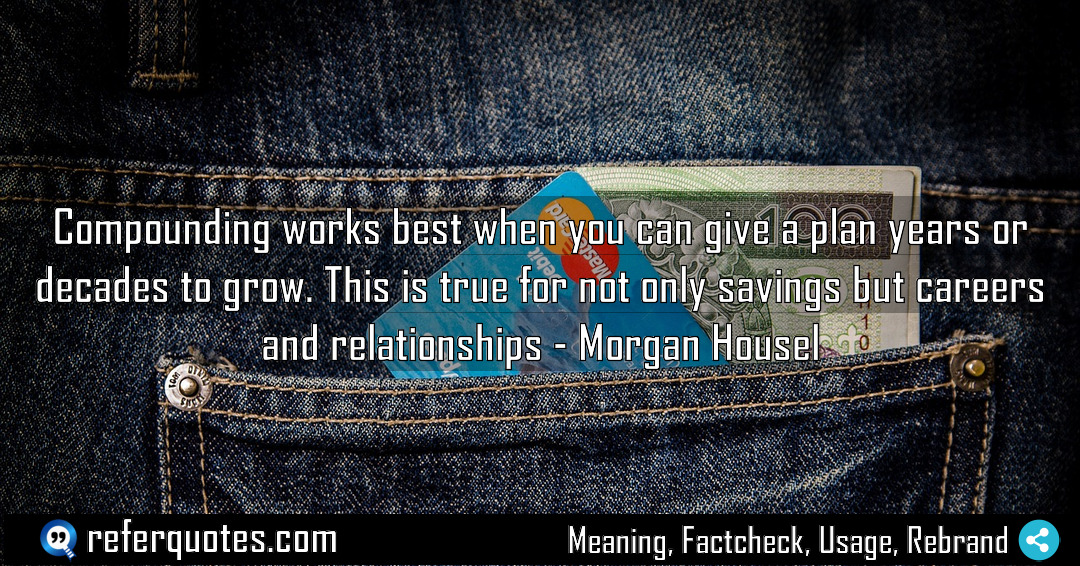
You know, when Morgan Housel says “Compounding works best when you can give a plan years…” he’s hitting on a universal truth. It’s not just about your stock portfolio; it’s the secret engine for everything meaningful in life. The real magic happens in the background, while you’re busy living.
Share Image Quote:
Table of Contents
Meaning
At its core, this quote means that the most powerful outcomes in life aren’t the result of one-off events, but of small, consistent actions that are given an absurdly long time to multiply.
Explanation
Let’s break this down. We all get the math of compounding interest, right? You leave money alone, and it starts earning money on the money it already earned. It’s a snowball effect. But what Housel does so brilliantly is he applies that same, relentless logic to the rest of our lives. Think about your career. The developer who spends 30 minutes a day learning a new language for two years becomes the undeniable expert. The salesperson who makes five extra check-in calls a week builds an unshakable network over a decade. And relationships? They’re the ultimate compounding asset. The small, consistent investments of trust, of listening, of showing up—they build a level of connection that no single grand gesture can ever match. The key, and this is the hard part, is trusting the process long before you see the dramatic results. You have to be okay with the boring middle.
Quote Summary
Reading Level60
Aesthetic Score70
Origin & Factcheck
This insight comes straight from Morgan Housel’s fantastic book, “The Psychology of Money,” which was published in 2020. It’s a collection of his essays on how people think about money and risk, and this particular quote is a cornerstone of his philosophy. You won’t find it misattributed to Warren Buffett or anyone else; this is pure Housel.
Attribution Summary
Where is this quotation located?
| Quotation | Compounding works best when you can give a plan years or decades to grow. This is true for not only savings but careers and relationships |
| Book Details | Publication Year: 2020; ISBN-10: 0857197681; ISBN-13: 978-0857197689; Pages: 256 (approx.) |
| Where is it? | Unknown chapter / page |
Context
In the book, this idea sits within a broader discussion about the power of patience and the often-invisible tail ends of long-term processes. Housel argues that financial success is less about sheer intelligence and more about consistent, rational behavior sustained over a very, very long time. He’s pushing back against the get-rich-quick mentality by showing that the real engine of wealth—and a fulfilling life—is remarkably slow and steady.
Usage Examples
So, how do you actually use this? It’s a mindset shift, really.
- For the impatient investor: Instead of chasing hot stocks, you focus on building a solid, diversified portfolio and then… you do nothing. You let time do the heavy lifting. The market’s average return is your best friend if you give it decades.
- For the ambitious professional: Stop looking for that one big break. Identify one small, valuable skill you can improve by 1% each week. In five years, you won’t just be better; you’ll be in a different category altogether.
- For anyone in a relationship: Don’t just rely on anniversaries and birthdays. The compounding returns come from the daily “how was your day?” conversations, the small acts of kindness, and consistently being a person your partner can rely on.
To whom it appeals?
Share This Quote Image & Motivate
Motivation Score70
Popularity Score80
Shareability Score75
Common Questions
Question: But what if I don’t have decades? I’m starting late.
Answer: The best time to plant a tree was 20 years ago. The second-best time is now. Compounding still works on shorter timeframes; you just start with a more intense focus. The principle doesn’t change—consistent, small actions still beat sporadic, giant ones.
Question: How do you stay motivated when you don’t see immediate results?
Answer: You have to fall in love with the process itself, not the outcome. Track your inputs, not just the outputs. Did you make the call? Did you do the study session? Trust that the results are coming, even if you can’t see them yet. It’s an act of faith in the math of the universe.
Question: Can compounding work negatively?
Answer: Absolutely, and this is crucial. This is the dark side of the force. Small, consistent bad habits—skipping workouts, avoiding difficult conversations, spending just a little more than you earn—also compound. They can derail a career, a health, or a relationship just as powerfully as good habits can build them.
Similar Quotes
Long-term planning is harder than it seems because our goals are a moving target. We think we’re planning for a future version of ourselves, but that person is constantly changing.…
You know, I’ve seen so many people chase the next hot stock or try to time the market perfectly, but the habit of regularly saving and investing is what truly…
Invest three percent of your income back into yourself… it sounds simple, but this is the secret sauce. It’s not about saving; it’s about actively building your most valuable asset—your…
If you want to do better as an investor, the single most powerful thing you can do is forget about next quarter’s earnings. It’s about letting time do the heavy…
You know, that idea “Less ego, more wealth” from Morgan Housel is so simple yet so profound. It basically tells us that the flashy stuff we buy to impress others…
